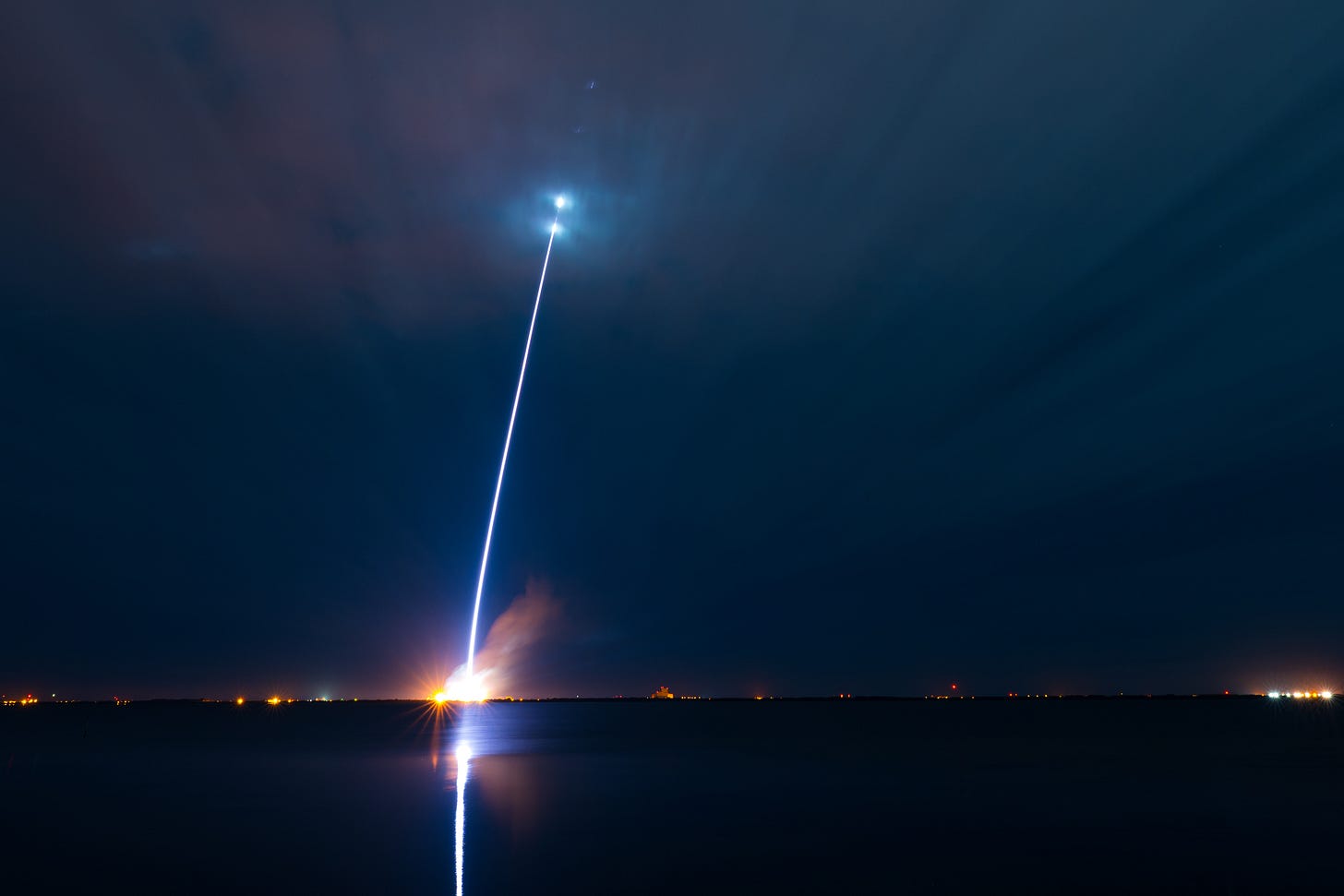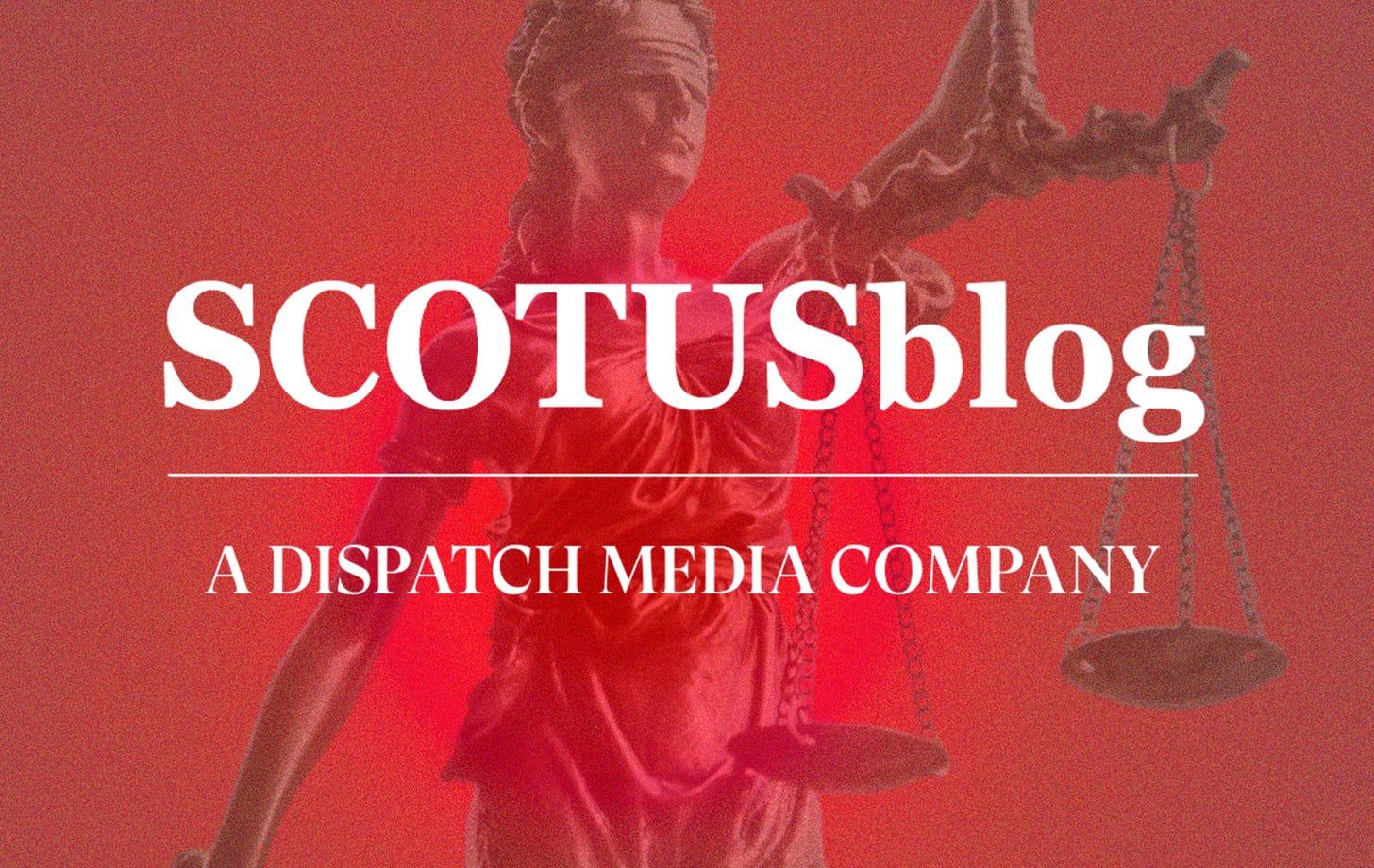My fellow pro-growth/progress/abundance Up Wingers,
Before I get to the spectacular success of America’s private space companies, I want to highlight my deep concern at how the Trump administration is wielding the fiscal ax with unusual vigor at NASA. The White House is proposing cuts that would slash the space agency's budget by nearly a quarter and gut its science programs with a 50 percent reduction that would terminate 41 of 124 active missions. Not great!
What makes this maneuver particularly brazen is the administration's apparent plan to sidestep Congress altogether. According to Ars Technica, the Office of Management and Budget has ordered NASA to draft "closeout plans" for dozens of missions, supposedly just for planning purposes. Reality check: The strategy seems designed to enact the president's budget priorities through administrative legerdemain, avoiding the need for congressional consent. Also not great.

Anyway, the casualties of the proposed cuts would be severe: the VERITAS and DAVINCI missions to Venus, Mars Sample Return, the Mars Atmosphere and Volatile Evolution orbiter, the Chandra X-ray Observatory, and even the stalwart Voyager probes would face termination. The OSIRIS-APEX mission to study asteroid Apophis, which will pass perilously close to Earth in 2029 , would also be axed, along with the LISA gravitational wave detector.
Beyond the immediate scientific loss lies a deeper concern. Once all those missions go dark and their teams disperse, resurrecting them becomes nearly impossible if Washington should change its mind down the road. America risks ceding its capacity and leadership in planetary science just as China's ambitions — and spending — soars. None of this exactly screams “new American golden age.”
Now onto what is a really encouraging development. Jeff Bezos gave Blue Origin the motto gradatim ferociter, step by step, ferociously. Finally, it seems, the rocket company is picking up the pace.
This year is shaping up to be both a turning point and a turn toward acceleration. The successful debut of the New Glenn rocket in January, a pending Mars mission this fall, and an increasingly aggressive push toward lunar landings suggest Blue Origin’s long-awaited evolution from a centibillionaire’s spacey side project to a credible (if still secondary) rival to Elon Musk’s SpaceX.
Of course, SpaceX remains the industry’s juggernaut, with more than 500 launches, a self-sustaining cash machine in Starlink, and a projected 170 missions this year. Blue Origin, by contrast, has only recently joined the orbital club. Its New Glenn rocket reached space on its first try, validating key technologies like its seven-engine first stage. But the booster was lost during reentry, underscoring the wide gap with SpaceX’s reusable Falcon fleet.
That gap is narrowing, though. Blue Origin’s second New Glenn mission, now scheduled for late 2025, will carry NASA’s ESCAPADE spacecraft to Mars.
More significantly, Blue Origin is preparing its Blue Moon MK1 cargo lander for flight in early 2026. (The crew-rated MK2 version is scheduled for a possible NASA Artemis V mission later in the decade.) As Eric Berger of Ars Technica writes, “Barring a major setback, it now appears highly likely that Blue Origin will beat SpaceX in landing a vehicle on the lunar surface.”
Meanwhile, SpaceX’s Starship rocket has faced some serious ongoing challenges, with its most recent four test flights not meeting their planned objectives — sometimes in explosive fashion. That (presumably short-lived) vulnerability is what gives Blue Origin an opening to land first on the Moon and to show NASA it can deliver on Bezos’ vision and beyond.
For now, though, Blue Origin’s role will likely remain complementary, at best. With less than $1 billion in revenue versus SpaceX’s $15 billion, and a dramatically lower— to put it generously — launch cadence, its balance sheet and performance shortfall is enormous. For now, Blue Origin lacks a Starlink-style financial flywheel. Its near-term economic case depends on government contracts and Amazon’s embryonic Kuiper satellite business.
That said, Blue Origin no longer looks like merely a monumentally expensive hobby for the Amazon founder. If it nails its lunar lander timeline while Starship continues to drag, Bezos may finally claim a symbolic win in the billionaire space race. More importantly, America’s future as the leading spacerfaring nation looks a bit more likely. Something like this, perhaps:
By 2050, America’s space ambitions will look less like science fiction and more like strategic infrastructure. Low-Earth orbit, once the domain of government astronauts, is now home to a quartet of private stations. Orbital factories generate $15 billion in annual exports. Tourism flourishes, with eight thousand passengers a year — scientists, celebrities, and the ultrarich —rotating through microgravity hotels. Suborbital “Starships” make cargo runs from New York to Tokyo in 85 minutes.
Further afield, a semi-permanent Artemis Base Camp hugs the rim of the Moon’s south pole. Blue Moon landers shuttle ice miners, engineers, and equipment. Lunar regolith shields habitats; solar towers feed power-hungry bioreactors. NASA’s Gateway outpost has grown into a bustling logistics hub, with one commercial node leased to biotech firms. Monthly crew rotations are sustained by orbital propellant depots, filled using water extracted from Shackleton Crater.
Mars hosts a six-person base near Valles Marineris, supplied by nuclear-thermal tugs and powered by methane cracked from the red planet’s CO₂ and ice. It opens for business each synodic launch window, repeating the Moon’s template of small steps backed by corporate ledgers.
A gigawatt-scale solar power array in geostationary orbit now beams electricity to California. A relocated asteroid offers in-space metals. The U.S. Space Force, meanwhile, manages orbital traffic and keeps watch with rapid-launch satellites and laser-equipped drones. America’s presence in space, once exploratory, is now economic, strategic, and enduring. [Scenario written with the help of ChatGPT 4o.]
SpaceX looks to be a key player such a future, but there needs to be many other participants, including Blue Origin. Such will be the foundation of a golden Space Age for America.
As Congress Does Less, The Courts Are Doing More
Breaking news: The Dispatch has acquired SCOTUSblog, the gold standard in Supreme Court analysis.
Reliable coverage of the Supreme Court has never been more important. With an unbridled executive branch and a Congress eager to surrender its constitutional prerogatives, the federal judiciary is playing an increasingly important role in shaping the country’s direction.
Join 600,000 loyal readers and check out The Dispatch today. No insulting clickbait, no false outrage, no annoying auto-play videos—just reliable journalism that helps you understand the big decisions that will shape our nation’s future.
Faster, Please! readers: Take 25% off a Dispatch membership today
Micro Reads
▶ Economics
Female-Dominated Industries Driving Payroll Growth - Richmond Fed
▶ Business
▶ Policy/Politics
Utah Has Found the Right Middle Ground on Artificial Intelligence - National Review
▶ AI/Digital
▶ Biotech/Health
Controversial 'Synthetic Human Genome Project' Spurs Debate Over Ethics of Building Human DNA from Scratch - The Debrief
Noland Arbaugh, Neuralink’s First Brain Interface Recipient, Reflects on Neurotechnology, Ethics, and Identity - The Debrief
▶ Clean Energy/Climate
Laboratories of Bureaucracy - Competitive Enterprise Institute
▶ Space/Transportation
Did the ‘Deep State’ Invent the U.F.O. Craze? - NYT Opinion
DARPA says decreasing launch costs, new analysis led it to cancel DRACO nuclear propulsion project - SpaceNews
▶ Up Wing/Down Wing
Eat Your AI Slop or China Wins - New Atlantis
Prophesied Disaster (Likely) Won’t Strike Japan This Weekend - Bberg Opinion
▶ Substacks/Newsletters
What I learned trying seven coding agents - Understanding AI
Age of Invention: All Fired Up - Age of Invention
We can't afford to keep cutting taxes for the rich - Noahpinion
Mary Meeker Report - Is this an AI Bubble? - AI Supremacy
US Health Care Expenditures: An Ominous Trend Returns? - Conversable Economist
Please check out the website or Substack app for the latest Up Wing economic, business, and tech news contained in this new edition of the newsletter. Lots of great stuff!







Some good up wing news here from industry offsetting a lot of down wing decisions by GOP leadership in Washington.